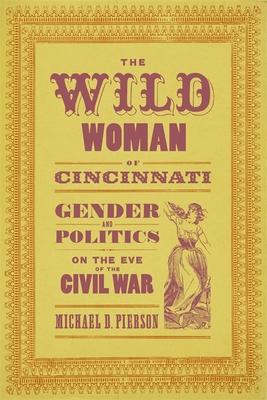Popular entertainment in antebellum Cincinnati ran the gamut from high culture to shows barely above the level of the tawdry. Among the options for those seeking entertainment in the summer of 1856 was the display of a "Wild Woman," purportedly a young woman captured while living a feral life beyond the frontier. The popular exhibit, which featured a silent, underdressed woman chained to a bed, was almost assuredly a hoax. Local activist women, however, used their influence to prompt a judge to investigate the display. The court employed eleven doctors, who forcibly subdued and examined the woman before advising that she be admitted to an insane asylum.
In his riveting analysis of this remarkable episode in antebellum American history, Michael D. Pierson describes how people in different political parties and sections of the country reacted to the exhibit. Specifically, he uses the lens of the Wild Woman display to explore the growing cultural divisions between the North and the South in 1856, especially the differing gender ideologies of the northern Republican Party and the more southern focused Democrats. In addition, Pierson shows how the treatment of the Wild Woman of Cincinnati prompted an increasing demand for women's political and social empowerment at a time when the country allowed for the display of a captive female without evidence that she had granted consent.
Book
The Wild Woman of Cincinnati: Gender and Politics on the Eve of the Civil War
(Write a Review)
Hardcover
$40.00
Popular entertainment in antebellum Cincinnati ran the gamut from high culture to shows barely above the level of the tawdry. Among the options for those seeking entertainment in the summer of 1856 was the display of a "Wild Woman," purportedly a young woman captured while living a feral life beyond the frontier. The popular exhibit, which featured a silent, underdressed woman chained to a bed, was almost assuredly a hoax. Local activist women, however, used their influence to prompt a judge to investigate the display. The court employed eleven doctors, who forcibly subdued and examined the woman before advising that she be admitted to an insane asylum.
In his riveting analysis of this remarkable episode in antebellum American history, Michael D. Pierson describes how people in different political parties and sections of the country reacted to the exhibit. Specifically, he uses the lens of the Wild Woman display to explore the growing cultural divisions between the North and the South in 1856, especially the differing gender ideologies of the northern Republican Party and the more southern focused Democrats. In addition, Pierson shows how the treatment of the Wild Woman of Cincinnati prompted an increasing demand for women's political and social empowerment at a time when the country allowed for the display of a captive female without evidence that she had granted consent.Hardcover
$40.00